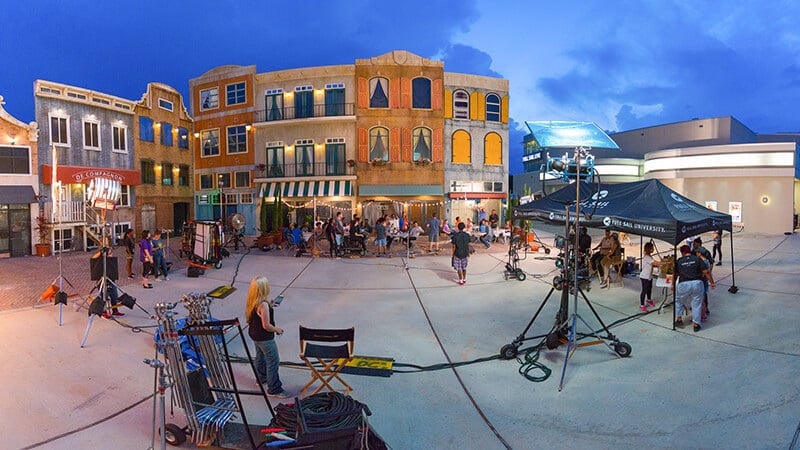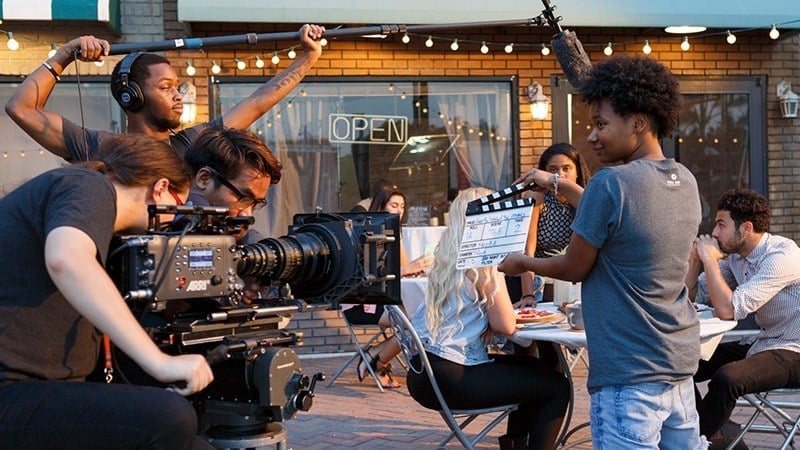Career Information
Hollywood and Beyond: What You Can Do in Film
"There are a million ways to build a career by capturing and delivering moving images," says Antonio "T.J." Doctor, a course director in Full Sail University's Film department. For several years he's worked in film production for the Sundance Filmmakers Lab and Directors Lab, assistant directed short and feature films, and served as camera operator on a number of projects.
"Take a tally of how many moving images will you see today. News, commercials, internet pop-ups and banners, billboards, video games, and even the videos you watch standing in line at the bank or amusement park were created by film and video professionals."
There's a big, wide world of filmmaking out there that stretches far beyond Hollywood studios. In this article, we'll go over some of the areas you can consider if you're looking for a career in filmmaking, like:
- Studio Feature Films
- Independent Films
- Documentary Films
- Television
- Commercials and Media
- Corporate Films
We'll start with an area you already know well. It's the industry most people think of when they think of filmmaking: studio feature films. These are big movies with big budgets, big names, and big marketing campaigns behind them. It's the Disney, Marvel, Sony, and Universal Studios of the world. It's Scorsese, Spielberg, Coppola, Kubrick, and Tarantino.
In theory, everyone at this level is at the top of their game: well-funded crews, famous actors, and iconic studios. That's why this level of film production is also one of the most difficult to break into.
"It's a very tight-knit community," T.J. explains. "You're working with the same people for a very short period of time, but you're working with them a lot. So it's a very short, but intense, relationship with all the crew members."
But in a gig-based industry, job security is harder to come by in feature films. T.J. says, "You're going to have to work for your next job, even while you're on your current job. You're working on one feature, but even during that feature, you're going to have to plan on where that next paycheck is coming from."
It's more difficult to clearly define independent films and what makes an independent filmmaker. Many major studios fund smaller film production companies to create films with a more indie movie feel. And with new profit-sharing models, some indie films have bigger budgets to work with and are changing the landscape of the market.
Most strictly independent filmmakers tend to work with a smaller budget, smaller crew, lesser-known cast, and shorter timeline for filming. In general, independent films are known for their ability to take more risks with storytelling, reach niche audiences, and create what's considered to be more "artsy" movies. Film production on independent projects can have a more DIY and scrappier feel than the polished machines that make studio feature films.
"If you're looking for more intimate storytelling, if you're looking for more people-originated stories, then documentaries are where you want to land," says T.J.
While there are many different types of documentary films, they all generally rely on research-driven or journalistic storytelling, no scripts, and real people and locations instead of actors and film sets. For example, famous documentarian Ken Burns is known for using archival footage and photographs to bring to life his historical documentaries. Depending on the documentary style, the crew and film production equipment tend to be smaller and more mobile compared to big-budget studio films.
"If you're not all about the red carpet and buzz and working with major artists – because you want to tell real, true stories, or at least real, true stories from your perspective – then documentary is definitely a film that would fit a filmmaker like that," T.J. explains.
Since the subject matter is the driving force behind documentaries – not a script or storyboard – timelines can vary greatly. Documentarians have to remain adaptable and nimble to be ready to follow the subject into unexpected territory and capture key moments of the film.
From dramas to comedies, reality TV to talk shows, television spans a wide variety of filming styles and production norms. You may be filming on location, in a studio, with a live audience, or on a live broadcast.
"For someone who wants to not travel a lot, stay locally based, or have more consistent hours, the television market is a little better for that," T.J. says. "However, with television, sometimes you can get pigeon-holed." He explains that flexibility from position to position is a little more rigid on TV shows when compared to a film set where different opportunities may arise during a film production.
Production teams in television can typically expect a quicker turnaround with tight timelines, smaller budgets (compared to feature films), and a limited set. Of course, this comes with exceptions for prestige shows (think Game of Thrones or the scores of high-production shows dominating streaming services), limited series (which tend to resemble long-form feature films), and high-profile live events like the Super Bowl.
With the average TV ad ranging from ten seconds to three minutes, commercial shoots are usually shorter and under stricter timelines and storyboard constraints than other types of film.
"For somebody who is super-organized and wants a very fast pace at the production level, commercial work and music video work are good places to go," T.J. says. And with such quick turnaround times, you won't have to wait as long to see your work distributed.
Some shoots work in close contact with marketing agencies or in-house corporate teams on the creative direction of the commercials. The budget, talent, and set may vary depending on the client, and the crew may be made up of outsourced or in-house production teams.
"You're not going to get any commercial work without an agent, at least at the big levels," T.J. explains. "And often times that requires already having produced a body of work that's garnered a reputation."
Corporations have increasingly looked to film for more than just the traditional training videos and internal communications. Video now plays a larger role in branded content, product descriptions, event content, and online marketing.
“This work fits right into the mold of any filmmaker coming out of film school. Corporations need video content that needs to be shot, edited, and delivered to them," says T.J.
Of course, the drawbacks to working in the corporate film market have to do with creative freedom. T.J. explains, "Creative liberties aren't always there as they would be with something like a commercial or a music video because you're serving a client at the end of the day.
"The good thing is, they are a great way to sustain a living and a career," he continues. "Not many people realize that's where you can apply your film and video knowledge. These projects aren't going to be hugely distributed where everyone is seeing your work, but they typically pay very well.”
While each of these different areas of the film industry are unique, they do share common roles. If you're interested in pursuing a film careers Wand would like to learn more about how your skills and interests can fit in, we've also put together a handy guide to the different roles that exist within the film industry.
Want to learn more? Explore our film and television degree programs.
Whether you’re ready to apply or just want to learn more about Full Sail University, our Admissions Representatives are here to help. Call us or request more information.
Keep Exploring
- Media Communications
- Bachelor's
- Interactive
- All Access
- Game Design
- Hall of Fame
- Career Networking Events
- Web Design & Development
- Media & Communications
- Military
- What's Your Job?
- Music & Recording
- Creative Writing
- Accolades & Awards
- GRAMMYs
- Mobile Development
- Infographic
- Digital Cinematography
- Facilities
- Recording Arts
- Sportscasting

